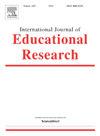The Nordic perspective on the association between distributed leadership and teacher job satisfaction: A multilevel SEM approach
IF 2.6
3区 教育学
Q1 EDUCATION & EDUCATIONAL RESEARCH
引用次数: 0
Abstract
In this study, we address the lack of robust empirical evidence on the association between distributed leadership and teacher job satisfaction with the work environment in the Nordic countries by examining this relationship at the teacher and school levels, for both teachers and principals. We also explore how teachers’ shared perceptions of distributed leadership are associated with individual job satisfaction (i.e., contextual effects), surpassing the limitations of the single-level analyses. Using data from 11,788 teachers in 654 schools who participated in the Teaching and Learning International Survey (TALIS) 2018 in Denmark, Finland, Norway, and Sweden, we found a strong positive association between teacher job satisfaction with the work environment and teacher-reported distributed leadership at the school level, and a moderately strong association at the teacher level. In contrast, we found a negative contextual effect which suggested that stronger distributed leadership at the school level was associated with lower satisfaction of individual teacher in Norway and Finland. Additionally, principal-reported distributed leadership was weakly, positively associated with teacher job satisfaction with the work environment only in Sweden. This study shows mixed results: at the teacher level, stronger distributed leadership has potential to enhance job satisfaction, while at the school level, it can be linked to lower individual teacher satisfaction as shown in Norway and Finland. Our study further highlights the distinction between teacher- and principal-reported distributed leadership, as well as individual- and shared-teacher perceptions, and their potential differential effects on job satisfaction.
分布式领导与教师工作满意度关系的北欧视角:多层次SEM方法
在本研究中,我们通过对教师和校长在教师和学校层面的关系进行研究,解决了北欧国家分布式领导和教师工作满意度与工作环境之间缺乏强有力的经验证据的问题。我们还探讨了教师对分布式领导的共同看法如何与个人工作满意度相关联(即,情境效应),超越了单层次分析的局限性。我们使用了来自654所学校的11788名教师的数据,这些教师参与了丹麦、芬兰、挪威和瑞典的2018年教学与学习国际调查(TALIS),我们发现教师对工作环境的工作满意度与教师报告的学校层面的分布式领导之间存在很强的正相关关系,并且在教师层面存在中等强的关联。相反,我们发现了一个负面的语境效应,这表明在挪威和芬兰,学校层面上更强的分布式领导与更低的教师个体满意度有关。此外,仅在瑞典,校长报告的分布式领导与教师对工作环境的工作满意度呈弱正相关。本研究显示了好坏参半的结果:在教师层面,更强的分布式领导有可能提高工作满意度,而在学校层面,它可能与较低的教师个人满意度有关,如挪威和芬兰所示。我们的研究进一步强调了教师和校长报告的分布式领导之间的区别,以及个人和共享教师的看法,以及它们对工作满意度的潜在差异影响。
本文章由计算机程序翻译,如有差异,请以英文原文为准。
求助全文
约1分钟内获得全文
求助全文
来源期刊

International Journal of Educational Research
EDUCATION & EDUCATIONAL RESEARCH-
CiteScore
6.20
自引率
3.10%
发文量
141
审稿时长
21 days
期刊介绍:
The International Journal of Educational Research publishes regular papers and special issues on specific topics of interest to international audiences of educational researchers. Examples of recent Special Issues published in the journal illustrate the breadth of topics that have be included in the journal: Students Perspectives on Learning Environments, Social, Motivational and Emotional Aspects of Learning Disabilities, Epistemological Beliefs and Domain, Analyzing Mathematics Classroom Cultures and Practices, and Music Education: A site for collaborative creativity.
 求助内容:
求助内容: 应助结果提醒方式:
应助结果提醒方式:


